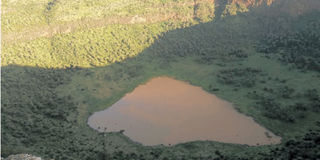The mountains of Marsabit

A lake in a crater - one of the many around Marsabit. Photo/RUPI MANGAT
What you need to know:
It’s hot, it’s dusty… and Marsabit is fast losing its tourist appeal in spite of its natural treasures.
The drive across the desert of stones is uneventful. A few years ago we had driven through the expanse when not a blade of grass showed through the weather-beaten stones strewn on the parched land.
Now the stones lie almost hidden in the tufts of grass sprouting after the rains. Amidst the flat lands, the pinnacles of the mountains announce the arrival of Marsabit, historically the main centre of the Cushitic Rendille. The old name for Marsabit is Saaku.
Memories of Marsabit from the 1981 camping trip on the rim of the volcanic crater in Marsabit National Park return.
The camp overlooked Marsabit’s iconic Lake Paradise. The sapphire-colour lake is the jewel in the crown where elephants and other big game come to quench their thirst.
The most famous of them was Ahmed who, for almost 63 years, frequented the lake. He died at a grand old age in 1974 boasting very big tusks that almost reached the ground.
President Kenyatta had him under 24-hour presidential protection. Poaching took its toll on the park in the ensuing years.
However in 1888 when Teleki’s party was on their return journey from Turkana, there was not a single elephant between the lake and the mountains of Marsabit, revealing that the elephants were likely on their annual migration.
Back in the ‘80s, Marsabit had few dukas and few residents. Fast forward to the present and there are plastic papers on acacia trees and litter by the base of a hill, announcing the arrival of what should be a beautiful town to compliment its surroundings.
Filthy streets, dukas and bars are neighbours with a modern bank. The KWS campsite in the park a few minutes drive away, though beautiful, is unkempt, with no water and very inept staff.
A guide book points to Henry’s and Rosanna’s camp on the outskirts of town and it takes just a hoot to have the daughters open the gate and provide us with the necessary information about charges and facilities.
There’s hot water showers and electricity and a campground on the base of Gor Redo in picturesque surroundings.
A Borana woman, Chukuliza (aka Rosanna) started the campsite after the kids had grown up.
She points to Gor Ogardi where the lugga below has water and in the lowlands, the spread of the Chalbi desert and the three pyramid hills that could pass for the pyramids of Giza.
Michael drives us to one of the volcanic craters surrounding Marsabit, passing the enormous church on another volcano with two windmills to generate power.
Few hills remain with the virgin forests intact.
High up on a crater we look down to see an earth-coloured lake – not quite Lake Paradise but nevertheless breathtaking. The sun sinks and we head out – only to see two young hyenas foraging at the dumpsite by the crater.
Send your feedback to [email protected]




